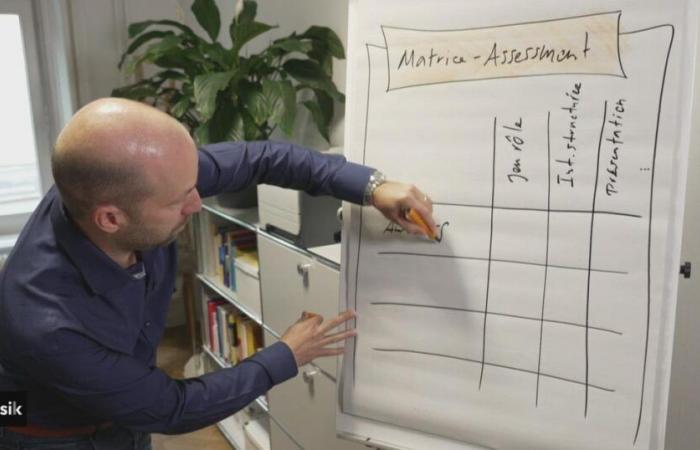Assessments – these days of evaluating candidates during internal recruitment or promotion – are booming in Switzerland. More and more companies are turning to this method to hire candidates for positions of responsibility or for internal promotion.
“Very serious”, “essential”, “difficult to bias”, “big rubbish!”, “a very profitable market”: the reactions sparked by the call for testimony from the Basik show on social networks regarding the assessments were numerous and very clear-cut.
At the Broye Medical-Social Center, we meet Hélène Morgenthaler, director of the establishment. For this triathlon and marathon enthusiast, her assessment day, passed 4 years ago, remains an extraordinary event: “It was very intense, very stressful. […] I had eight key skills that I was tested on, I did at least six exercises over the day. […] At the end, I was exhausted, I said to myself ‘never again!'”. A few days later, she received the report of her performance, which, according to her, reflected her strengths and her personality.
More and more assessment firms
Apart from a few large companies which have a specialized in-house service, the vast majority of firms outsource this service. There are more and more companies specializing in assessments in Switzerland: there is no official data listing the number, but the impression is widely shared by specialists in the sector, such as the competence center Swiss Assessment.
We followed an assessment for recruitment to a management position with the SBB, at the Avenir Group firm located in Bern. Occupational psychologist, Félix Hauswirth has been preparing for this moment for several days, in close collaboration with the commissioning company: “We asked for the job specifications, we were interested in the important skills for this position, and then with the company we worked together on concrete practical exercises for a scenario during this assessment”, he explains in the show Basik.
On arrival, the candidate has 20 minutes to prepare for the first exercise of the afternoon: she must present herself for around twenty minutes under the watchful eye of two occupational psychologists. Ten minutes of questions and answers follow, then the exercises continue. After a structured interview on technical aspects of the profession and a case study, she must then participate in two role plays carried out by the assessors. These exercises are supposed to make it possible to evaluate one’s social skills, one’s “soft skills”, and thus allow the firm to make a well-founded recommendation to the recruiting company.
Bad recruitment can cost the company much more. This can demotivate a team, and having to relaunch recruitment is problematic in terms of image.
A day like this brings in on average between 5,000 and 7,000 francs for each candidate evaluated. Despite this price, Maurizio Arametti, director of French-speaking Switzerland for the Avenir Group firm, does not see demand weakening, on the contrary: “Every year, [l’augmentation de la demande] is around 5% for us.”
The CFF did not wish to give us their motivations for carrying out an assessment with a view to recruiting an executive.
But for Sophie Heurtault-Malherbe, deputy general director of the Fédération desentreprises romandes in Geneva, it is money well invested: “Poor recruitment can cost the company much more. If you do not recruit the right person, it can demotivate a team, and having to relaunch recruitment is problematic in terms of image.” According to her, well-conducted assessments are a good way to see how the candidate reacts under stress, a typical situation in positions of responsibility.
We think we measure people’s performance or the fact that they find themselves in a real situation. In reality, this is not the case: people are playing a game
But this enthusiasm is not shared by everyone. Christophe Genoud took numerous assessments while looking for a job after 15 years in the civil service in Geneva. From his many experiences, he produced a very critical book on management practices, and the assessments are not left out. “We think we measure people’s performance or the fact that they find themselves in a real situation and will behave in a real way. In reality, it is nothing of the sort: people are playing a game,” he tells us. -he.
Multiplication of psychological tests
His criticisms are particularly aimed at online psychological tests – which generally precede assessment days: there are hundreds of them on specialized sites, the best known being the “Insight” test which classifies personality into four colors.
Christophe Genoud has kept the reports of his results and analyzes them critically: for him, they are made up of sentences general enough – and often flattering – so that everyone wants to identify with them. These are “sentences which serve as a hook, that is to say they are indisputable. And this is typical of the Barnum effect (subjective validation effect, editor’s note.) that we use in this type tool, because it legitimizes everything that follows. The horoscope works on this mechanism”, underlines the Genevan.
These tests are a photograph at a time T, which uses a scientific approach but has no scientific value
These psychometric questionnaires all work in a similar way, and according to Anne Donou, French-speaking director of the Von Rundstedt consulting firm, they serve above all as a basis for discussion with the candidate: “It is a photograph at a given moment, which uses an approach scientific but which has no scientific value […] It must be taken with great caution.” Here too, companies specialize in the creation and validation of these tests, then selling them to assessment firms at a price ranging from 50 to 600 francs per test.
Research examines the predictive validity of assessments: if these tests make it possible to predict to a certain extent differences in performance between candidates, many other less expensive tools – because they are carried out by human resources – do just as well.
Micaela Mumenthaler






